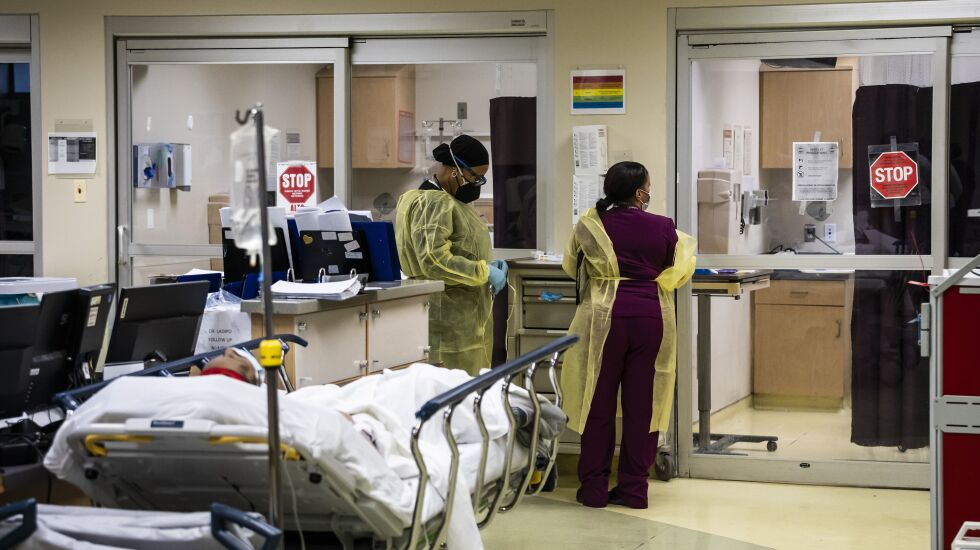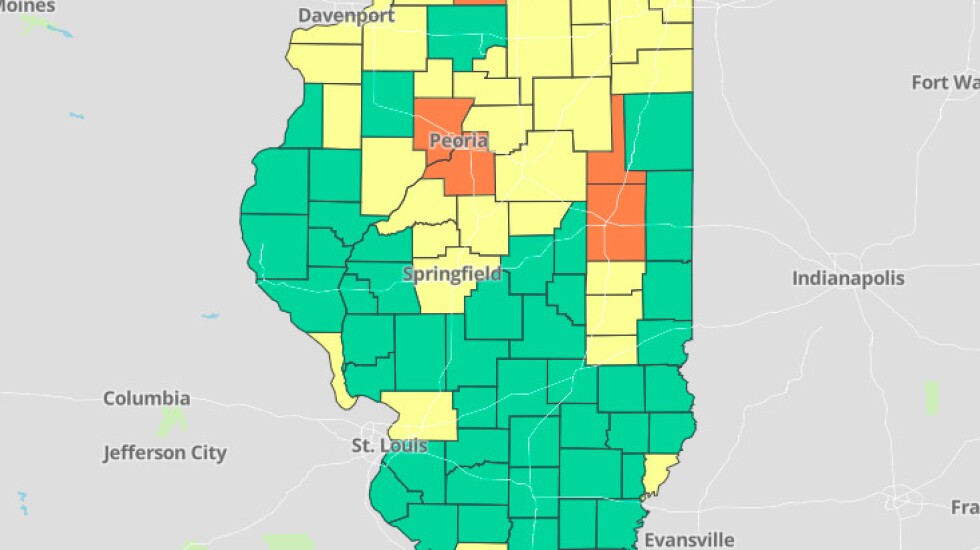
Public health officials are now urging residents to mask up indoors in eight Illinois counties as COVID-19 cases and hospitalizations keep trending upward statewide — and the Chicago area isn’t far behind.
Moving up to orange “high” on the color-coded coronavirus risk rating system set by the U.S. Centers for Disease Control and Prevention are Boone, Lee, Stephenson and Winnebago counties in the northwest portion of the state, along with Champaign, Ford, Peoria and Tazewell in the central region.
Cook County is among 39 other counties in the state at the yellow “medium” risk level, according to the latest CDC figures released Friday, meaning masks are only recommended indoors for older people and the immunocompromised.
But the state’s most populous county might soon find itself marked orange on the color-coded map along with most of Chicago’s collar counties.

Counties are flagged yellow when they reach a weekly case rate of 200 or more new infections per 100,000 residents. Cook is up to 367.
Counties go orange when hospital admission rates hit 10 or more per 100,000 residents for the week. Cook is just shy of that level at 9.8. Lake, McHenry, Kane, DuPage and Will counties are approaching the “high” level, too.
While Dr. Rachel Rubin, senior medical officer for the Cook County Department of Public Health, said earlier this week she thought the county was “unlikely” to hit the high threshold, Chicago Public Health Commissioner Dr. Allison Arwady said she thinks it could happen next week.

“Even if Cook County moves to High, as long as the healthcare system in Chicago remains stable we likely will not automatically reinstate a mask mandate,” Arwady said in a statement. “We may, however, advise high-risk people to consider limiting non-essential indoor gatherings.”
Cases have been on the rise statewide since mid-March, or a few weeks after Gov. J.B. Pritzker lifted his indoor mask mandate.
New COVID-19 cases by day
Graphic by Jesse Howe and Caroline Hurley | Sun-Times
Source: Illinois Department of Public Health
Graph not displaying properly? Click here.
With the onset of more infectious Omicron subvariants of COVID-19, average daily case numbers have multiplied by a factor of five since then, but the latest figures suggest the case rise might be slowing down a bit. The Illinois Department of Public Health recorded 40,193 new cases over the past week, an increase of less than half a percent from the previous week.
Hospitalizations have doubled overall across the state since March 20, though those figures have held steady for the past few days with just over a thousand patients in COVID wards.
COVID deaths are near a pandemic low with roughly eight Illinois lives lost per day over the past week. But they typically trail a few weeks behind an uptick in cases.
Officials have said the state would be weathering a massive surge right now if it weren’t for the protection of vaccines. About 69% of Illinoisans have completed at least their initial vaccine series, and 52% have gotten a booster.
“With COVID-19 case counts rising across the state, the public should understand that they can take action to protect themselves, their loved ones, and friends,” acting Illinois Public Health Director Dr. Amaal Tokars said in a statement.
“Everyone should make sure they are up-to-date with vaccinations and booster shots. As we see movement into higher community risk levels, masking up in indoor public places and avoiding crowded indoor spaces as much as possible will also make a difference.”
For help finding a shot, visit vaccines.gov.







